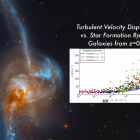Galaxy Evolution in Medias Res: Is ISM Turbulence Produced by Gravity or Feedback?
In the midst of galaxies' often violent evolution, a smooth, quiescent gas disc supported by thermal pressure alone is rarely found. Rather, interstellar media (ISM) in galaxies are wracked by supersonic turbulence, and turbulent pressure plays a key role in their support. The ultimate source of this turbulence remains unknown: is it star formation feedback, gravitational instability, or some combination? In this talk, I will explore these two dominant paradigms for turbulent driving, looking at them from the perspective of globally averaged parameters such as the star formation rate, gas accretion, and gas fraction within the galaxy. I will show that H-alpha observations of galaxies from redshifts z=0-2 and cosmological simulations suggest that gravity is the ultimate source of ISM turbulence in at least rapidly star-forming, high-velocity dispersion galaxies.

